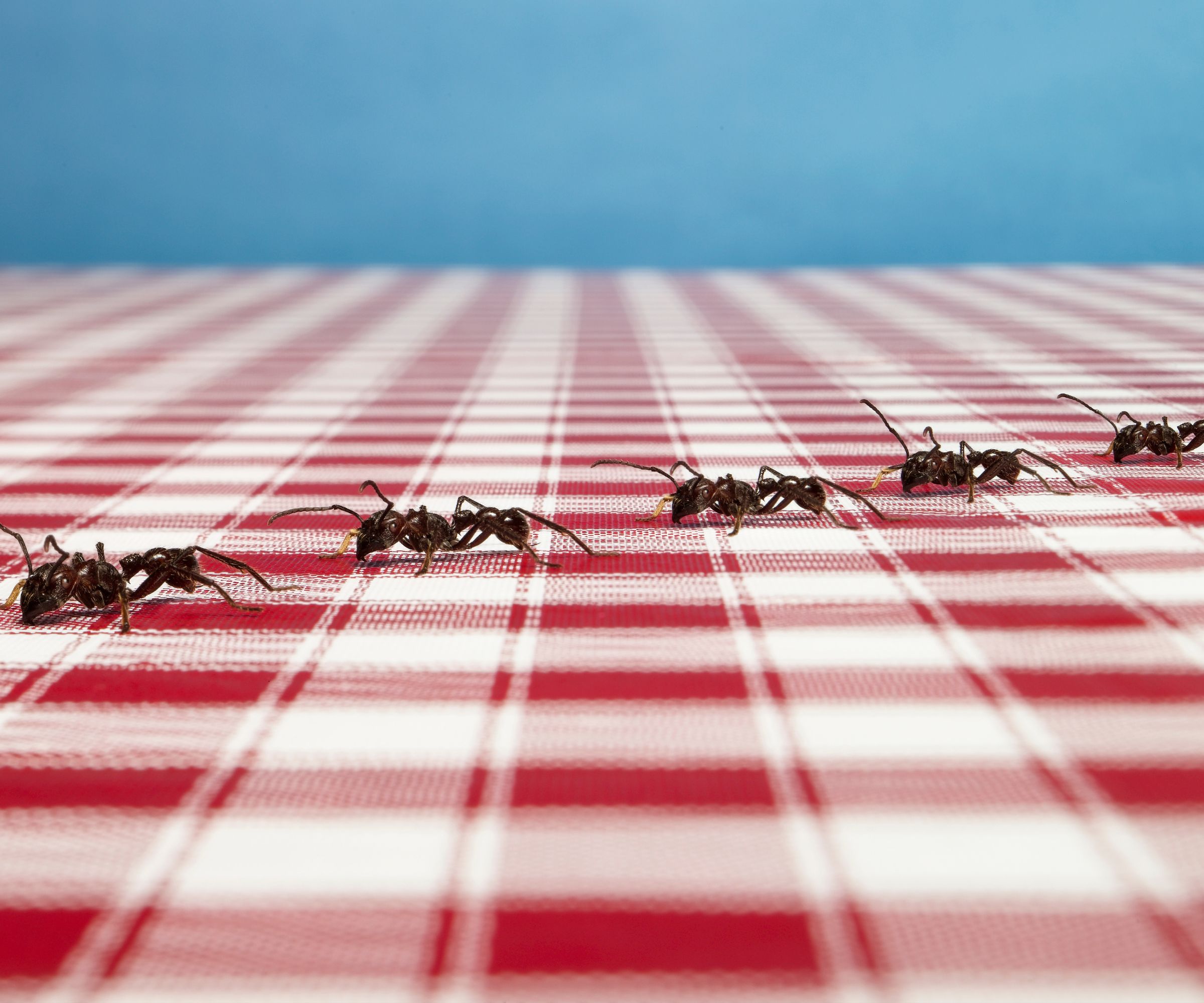
While it is no surprise that, if given the chance and temptation, ants will make a beeline for your kitchen, this doesn't mean an ant invasion in the kitchen is something to put up with. If you notice a few of these pests heading to your kitchen, chances are more are likely to follow their trail, so it's important to get rid of them and deter them as soon as possible.
Cleaning the kitchen properly and wiping up spills as soon as they happen will, of course, help to prevent them, but a combination of targeted treatments and preventative measures will be most effective in the long run. These can ensure these small, persistent pests don't become a recurring problem.
We asked pest control professionals how to get rid of ants in the kitchen and the different methods they use to target their colonies, disrupt their routes, address the source of their presence, and the deterrents that stop them coming back.
How to get rid of ants in the kitchen
Ants are naturally drawn to our kitchens because of the abundance of food and water and the shelter they provide from outdoor predators.
However, there are dozens of species of ants with different biologies and behaviors, so successfully tackling an infestation, like how to get rid of carpenter ants, requires a strategic approach. As a rule, the best way to deal with any pest is to understand their behaviors, from their routines and how they live to how they communicate and their likes and dislikes. That way, you can understand how to root them out for good using specialist ant treatments and ensure your home or yard is an unattractive space they won't be tempted to return to.
These steps cover all bases to rid your kitchen of ants and prevent future invasions.
1. Combine baits and pesticides

The first stage to getting rid of ants from your kitchen for good is to ensure any colonies taking up camp in your home are irradicated. The best way to do this is with bait and pesticide combinations.
'Ant baits and gels specifically target the breeding queen – the worker ants will take this gel to the queen to consume. If you just target the worker ants then the queen will continue to make more,' says Anna Mollins, a pest control expert from PestFix. Worker ants will return the bait to their colony to feed the larvae. The workers and the queen then eat the byproduct from the larvae, contaminated by the bait.
Avoid using repellents at this stage, or it may stop the ants from picking up the bait and pesticide, throwing them off course.
At the same time, apply a pesticide, whether dust or an ant spray from Walmart in the areas where you have seen ants and along their trails. Focus on cracks and crevices, the edges of the counters, underneath the counter, underneath appliances, and along baseboards. The ants will get the pesticide on their feet and antennas, and when they groom themselves, they then ingest it while carrying the bait back to the colony.
If you want a home remedy, Georgios Liakopoulos from Fantastic Pest Control recommends: 'Mix borax with a sweet substance like honey or sugar and you'll make a powerful ant bait that ants will take back to their nests. When consumed, ants pass it along, causing the demise of numerous colony members. Its slow-acting nature takes 48 to 72 hours to eliminate ants.
'Baking soda and powdered sugar can also work as ant bait. Sugar will attract ants, but baking soda will kill them.'
2. Disrupt their scent trails

The next step is to disrupt the ant pheromone trails that ants use to communicate the location of a food source in order to prevent their return. Ants rely on these trails to navigate to and from their nests, and the more ants that follow these trails, the stronger they become. By disrupting these trails, you can throw off their communication and navigation, making it harder for them to find their way back to your kitchen.
The owner of E.C. House Cleaning, Eliana Coca recommends: 'Use a natural repellent like a mixture of vinegar and water. Because vinegar is acidic, it disrupts ants' scent trails and deters their movements. Spray this solution directly on the ants and along the paths where they travel. I also recommend cleaning with vinegar – wipe down countertops, floors, and other surfaces.'
Liquid detergent mixed with water and lemon juice's acidic properties can also disrupt the pheromone trails.
However, cleaning, removing, or disrupting the pheromone trail only provides results sufficient to halt the presence of ants temporarily, so once you've done this, it's important to move on to the next stage straight away.
3. Locate and address the source

Knowing the kind of ant you are dealing with will help you find the right way to weed them out. Pest control professional Craig Sansig says that some ant species, like pavement ants, are quite easy to control, while other ant species, like odorous house ants (also known as sugar ants) and carpenter ants, are far more challenging. Infestations of some species, like pharaoh ants, may even become worse if treated incorrectly. Knowing the species will mean you can use the correct techniques to get rid of them.
Next (while this may not be realistic if you live in an apartment), if you can, follow the ants' trail as far back as possible to work out where they are coming from. This tackles the root of the problem.
Additionally, Brett Bennett, director of operations at PURCOR Pest recommends: 'Identify what they are being attracted to. Ants are always on the lookout for food sources, so figure out what specifically is attracting them in your kitchen.
'Are they going to your garbage can? If that’s the case, give your garbage can a thorough cleaning, make sure to take your garbage out often, or consider getting a new can with a lid. Are they going into your pantry? Is there a food item that has spilled or something that they are easily able to access? You may want to thoroughly clean your pantry and put your food items in sealable containers so they can’t be accessed.'
This may also be dependent on the type of ant you are dealing with, for example, Georgios Likopoulos says, 'The black garden ant is one of the most common household invaders, often attracted to sweet food. Moisture or decaying wood attracts carpenter ants, which threaten wooden structures.'
Once you have identified the type of ant and the source of its attraction to your home and kitchen, address these. You can use some of the methods below to do this:
Keep on top of crumbs and spills
Why do ants come into the house? For shelter, water, food, and a break from fending off predators. If you look at your kitchen from an ant's perspective, the need for regular kitchen cleaning becomes clear, as they will live off minuscule crumbs and can get into small gaps and crevices, like the area between the counter and the stove. Regular cleaning schedules are essential, as they keep the kitchen unattractive to future infestations.
Some militant vacuuming and wiping down of surfaces is crucial to get rid of ants, otherwise, they will keep coming back. Ensure there is no food left in the open, leftovers are stored in airtight containers, and that spills and crumbs are cleaned away quickly (a handheld vacuum cleaner will make quick cleans easy).
Shawn Varchetti of D-Bug Pest Control explains that ants are most attracted to a steady source of food. 'They really like sweet or greasy food, so kitchens are a great place for them,' he says.
'They only need tiny amounts of food, such as crumbs that have fallen to the floor or under cabinets, to be drawn into your home,' adds Shawn.
Deep clean your kitchen

One of the most pivotal actions to prevent ants from returning to your home once their trail has been disrupted is to deep clean the kitchen.
In addition to regularly cleaning up after yourself, it's important to periodically pay special attention to the hidden dirty areas of the kitchen we forget to clean, but ants will track down if left unchecked. This includes meticulous cleaning under appliances, inside cabinets, and especially around areas where food is stored, ensuring that your kitchen is devoid of food particles and residues.
Fix leaky faucets and plumbing
'Water can be as strong a draw as food is when conditions outside are dry and ants are in search of water,' says Craig Sansig, an entomologist from Viking Pest Control.
So, by fixing fix leaky faucets and dripping pipes, eliminating standing water, and keeping the kitchen sink clean and dry, you'll make things much less inviting for these pests.
Seal entry points
'Ants can make their way inside via tiny holes and cracks in and around the kitchen, so be sure to seal all holes and cracks along the foundation and any openings around exterior doors, windows, and utility penetrations,' advises Scot Hodges, an A.C.E. certified entomologist and VP of professional development at Arrow Exterminators.
'The pheromone trail ants emit – leading to the line of ants frequently observed – can lead you to an entry point.
'However, because ants are so tiny, identifying and eliminating every possible entry point may be very difficult. Ultimately, the best way to keep them away is to practice cleanliness in your kitchen.'
To seal cracks and crevices, you can use caulking, weather stripping, or, to ensure all cracks are entirely closed, expandable foam, like this Great Stuff smart dispenser pestblock from Amazon will do the trick.
Move pet food elsewhere
Ants feed on protein and sugars, making pet food an appealing snack. Consider moving your cat or dog's bowls to the other side of the kitchen and up off the floor at night, just while the ant problem persists. This will make it harder for the ants to find them.
Ensure your supply of pet food is stored securely in airtight pet food containers, available at Walmart, and that the bowls, and area around them, are kept clean.
4. Try natural ant repellents

There are all kinds of home remedies out there, many of which use strong scents to cause ants to lose their sense of tracking created with pheromone trails. Here are a few to try while keeping on top of kitchen cleanliness:
1. Clean with lemon juice: Spray juice on surfaces to disrupt their route or leave dried lemon peels at entry points.
2. Peppermint essential oil: Peppermint oil is a natural repellent for ants because of its strong scent. Sprinkle on cotton pads and place at entry points, under appliances, and in any other small spaces. You can also add a few drops of the oil to a spray bottle with boiling water and dishwashing liquid. Apply the solution around windows and doors, on ant trails, and in small cracks and holes. Continue the spray until you don't see ants anymore.
3. Display tansy flowers: These flowers are one of the smells ants hate, plus they can freshen up your kitchen.
4. Use cinnamon: Ants disdain the smell of cinnamon, so use powder, oil, or sticks to deter ants.
5. Sprinkle used coffee grounds: Ants hate coffee grounds. Place them on your windowsill to keep ants out. It's best to use coffee grounds outside around entryways.
6. Sprinkle diatomaceous earth: 'Natural diatomaceous earth is a powder made from fossilized algae that kills ants and other crawling bugs,' explains Georgios Likopoulos. 'Spread diatomaceous earth along ant trails and entry points to keep them out.'
7. Create chalk lines: 'Chalk works the same way,' continues Georgios Likopoulos. 'You can use chalk to draw around cracks under doors and near windows. Ants won't get through it. It's even okay to use talcum powder.'
Essential oils can be used in plenty of different ways throughout your home. They can be used in a solution with water to create a spray to deter ants or even used in a diffuser.
This one gallon bucket should be more than sufficient to keep ants out of your kitchen and the rest of your home throughout the year.
While you can use simple chalk sticks to throw off ant trails, using this loose chalk will allow you to easily spread the powder where need be, and vacuum it up after, to avoid discoloring your kitchen items.
FAQs
What is the fastest way to get rid of ants in the kitchen?
'The fastest way to get rid of ants in the kitchen isn't always the best way,' says pest control expert Matt Smith from Green Pest Management. 'You could use a kill-on-contact spray that will kill what it hits and deter them from coming in but it isn't going to do anything for the colony. That is why a lot of people get ants every spring because the source of the problem isn't dealt with.
'One experience that I had was with a couple who thought that they only had a few ants in the spring. They plugged in their toaster and it didn't work. They checked the toaster and pulled out the plug, when they did, ants came pouring out of the electrical outlet. The ants had gotten so bad that they shorted out the outlet.'
Instead, use baits and sprays, and look for products with active ingredient fipronil. The product gets on their arms and legs and they bring it back to the colony and it spreads like a virus from one ant to another. This process will take a few days, but after a week you should have the problem under control.
'Just remember to reapply to kill off anything that might have hatched from the previous application. With the better commercial products our technicians use, it typically only needs application every 3 months,' Matt explains.
Will apple cider vinegar kill ants?
Although spraying apple cider vinegar will help to get rid of ants, making them lose their sense of tracking through pheromone trails, white vinegar is generally said to be more effective. Clean with vinegar on kitchen countertops, cabinet door fronts, and around appliances to disinfect and stop ants in their tracks. This is a good option of you don't want to use chemicals.
Does cornmeal kill ants?
You can try sprinkling cornmeal in areas where you have seen ants because they are attracted to it, but unable to digest it. A mixture of baking soda and sugar is likely to have a bigger impact as ants love sugar, and the baking soda reacts with acid in their stomachs. As mentioned above, though, cornmeal on its own may not be enough, so consider using baits and pesticides and locating the ant nest if possible.
Use specialist ant treatments to put a stop to the ant conga line for good. Try to identify the type of ant infestation you have and get a good understanding of the size and extent of the ant nest (or nests, if you're unlucky) that might be in or near your home to ensure your solutions are apt to deal with your ant problem.
This way, you can enjoy cooking, eating, and socializing in your kitchen all year round without worrying about ants disturbing your peace.






